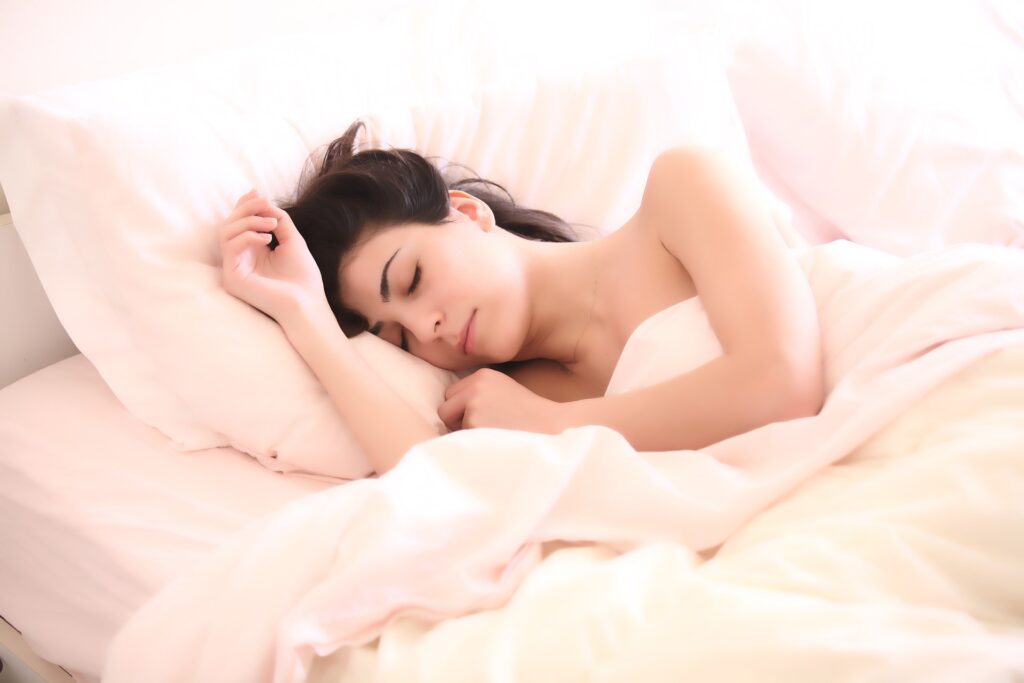<p>Many people have trouble getting to sleep. Not only can that make it hard to get through the day, but chronic sleeplessness can cause serious health problems like heart disease, obesity, and depression. The average adult needs between seven and nine hours of sleep. Here are some tips to help you meet that quota.</p>
<h2><b>1. Follow a consistent schedule</b></h2>
<p>Going to bed and getting up at the same time will help you develop a consistent sleep-wake cycle. While many people like to sleep in on weekends, you should limit the difference between weekday and weekend schedules to an hour.</p>
<h2><b>2. Don’t go to bed until you’re actually tired</b></h2>
<p>You will probably just toss and turn and get frustrated. If you haven’t fallen asleep after twenty minutes, get up and do something relaxing like reading or listening to music. Go back to bed when your eyelids start drooping.</p>
<h2><b>3. Make your bedroom a good place for sleeping</b></h2>
<p>For starters, reserve your bedroom for sex and sleep. Keep things like computers and work-related materials out of it to keep the psychological connection between your bedroom and sleep strong.</p>
<p>Also, make your bedroom a comfortable place to sleep with a cozy bed and soft pillows. Keep your bedroom cool, quiet and dark. The latter is particularly important, for light tells the brain that it’s time to wake up. Use curtains, blinds, or a sleep eye mask to block light. Block noise with earplugs or a device that generates “white noise.” Ceiling fans, for example, often produce a humming sound that people find restful. They also keep the bedroom cool. The ideal temperature for sleeping is somewhere between 60 and 75 degrees.</p>
<h2><b>4. Protect yourself from blue light.</b></h2>
<p>Computers, smartphones, LEDs, and televisions all emit blue light, a very bright light with a wavelength between 400-495 nm that has stimulating effects. It can, therefore, improve mood and make people feel more alert. Unfortunately, it also keeps the pineal gland from releasing melatonin, a hormone that helps control the sleep-wake cycle. Too little melatonin results in poor sleep.</p>
<p>The simplest way to protect yourself from blue light is to just turn off the computer and other blue light sources an hour or two before bedtime. If that isn’t feasible, wear special glasses that filter out blue light. You can also use apps on your computer or smartphone that will filter out the blue light.</p>
<h2><b>5. Be careful about what you eat and drink.</b></h2>
<p>Try to have dinner in the early evening, and don’t eat rich or heavy foods within two hours of bedtime. Similarly, avoid spicy foods and anything else that might give you heartburn or indigestion. Caffeine is a stimulant, so avoid coffee and other caffeinated drinks, foods, and medications for four to six hours before bedtime. While alcohol can make you feel drowsy, it can disrupt sleep later on. Avoid drinking alcohol within three hours of bedtime.</p>
<h2><b>6. Exercise early.</b></h2>
<p>Exercise is good for you and can help you sleep. You need to finish your workout at least three hours before bedtime, however, since exercise also stimulates the production of a hormone called cortisol. Known as the stress hormone, cortisol increases alertness, which is not what you want when you’re trying to sleep.</p>
<p>Most of these tips are lifestyle changes. Habits are notoriously hard to change, but once you do, you should enjoy a good night’s sleep. If you’re still routinely having problems getting to sleep, however, it’s time to see a doctor. Not only can chronic insomnia cause health problems, it can also be a symptom of some.</p>

6 Simple Tips to Improve Your Sleep
